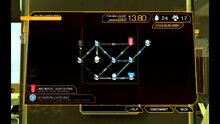A lot of games will feature small minigames that the player must complete to progress through the game, access special items, etc. These type of minigames usually have the player unlocking locks accessing certain objects and they usually involve the play moving the analog sticks in certain ways or pressing certain buttons. These type of games can be extremely frustrating as they become increasing difficult to complete and led the player to miss certain items or parts of games because they couldn't complete the minigame. They are also just boring and they break up the pacing of the game. Players don't want to be stopped in the middle of their game to spend 30 seconds to 2 minutes completing a minigame to open a door or a chest to progress or gain access to some item.
Example #1[]
Resident Evil: Revelations 2[]

In Resident Evil: Revelations 2, the player must complete an unlocking minigame to open certain chests in the game. When the player finds a locked chest in the game, they start the minigame. The player is then given a circular area where they must move their cursor around until they find an orange colored area. They must then hold down a trigger button to refine the area. The circle gets smaller and smaller and if you are in the correct area the controller begins to vibrate immensely and you unlock the box. if you are in the wrong area, you fail the minigame and must try again. The problem with these minigames isn't that they are particularly hard but that every time you find one of these boxes you have to complete the minigame (which game take up to a minute to finish) to unlock them and access the reward inside. It's extremely frustrating to have to complete these every time you find a chest, especially because it would have been so much easier to let the player open them without a minigame at all or just make the player complete a quick button press quicktime event.
Example #2[]
Almost identical to the previous example, Bethesda RPGs in general employ a lockpicking mini-game for each chest or door you wish to unlock. Although it may have been a mildly entertaining spin on picking mechanics prior to Fallout 3, the system has quickly become stale and it hasn’t been iterated upon in their games. In fact, Fallout 4 uses an identical system, a full seven years after it was implemented in FO3. Not to mention the same system was used in TES V: Skyrim (personally, I’ve played these games a lot and notice certain patterns in the unlock location of the pick, depending on difficulty; I can practically solve these with my eyes closed using sound and/or haptic feedback on a controller). As the author of this snack states, the same mini-game is used over and over, and in an RPG that’s a whole lot of time spent on the same mini-game. TES IV: Oblivion had an interesting take on the unlocking mechanic, but also had certain patterns to winning the mini-game which just made it a monotonous task. Compare all of this to TES III: Morrowind which had no lockpicking mini-game, just a random chance of unlocking depending on the lock difficulty, player character attribute statistics, and quality of pick. The aforementioned Fallout and The Elder Scrolls games give the player a choice to take a chance on unlocking depending on the player’s attribute stats and lock difficulty, which I assume most people use after collecting hundreds of lockpicks and don’t wish to waste any more time with the mini-game. This problem that persists across two franchises in one AAA company is just a small sample of forced mini-games that go stale quick. The solution to the forced mini-game is to eliminate it completely, make it more meaningful by reducing its occurrence (I stress this for any solution that is not total elimination), varying the solution and choices involved drastically, or creating vastly different mini-games.
- JimmyEatWorld91
Example: Hacking Terminals in Mass Effect
In the original Mass Effect, players could perform a 'bypass' by which they might open a door, locked box, or terminal. This game was essentially a circular version of Frogger where the player (a triangle) was required to jump across multiple rings traversed by blocks that would kill the player. Failure to reach the center would eventually lock the player out of the game permanently.
Example: Deus Ex: Human Revolution

An action stealth shooter game. The character can explore multiple paths to beat levels. They can climb through the air ducts to avoid enemies. They can just blast their way through the enemies in epic gun fights. They can even sneak up behind people and take them down stealthily. Yet between these awesome paths the player can take there are mini games. The player will hit a critical moment in the story and then be forced into using different mechanics than the ones he used to get there. They just don't fit with the enjoyable game play that attracts people to the game.